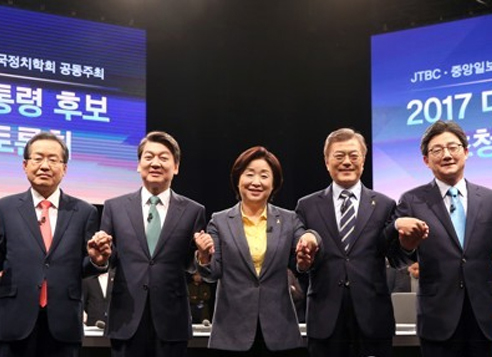The top five presidential candidates on Tuesday clashed over national security, job creation and economic polarization during their fourth televised debate with the election just two weeks away.
During the nearly three-hour roundtable discussion hosted by local daily Joong-Ang Ilbo, its cable TV network JTBC and the Korean Political Science Association, the candidates converged on the need to bolster defense against a provocative North Korea, but remained different on the origins of the security crisis and how to tackle it.
 |
The top five presidential candidates (from left) -- Hong Joon-pyo of the conservative Liberty Korea Party, Ahn Cheol-soo of the center-left People's Party, Sim Sang-jeung of the progressive Justice Party, Moon Jae-in of the liberal Democratic Party and Yoo Seong-min of the conservative Bareun Party -- pose for a photo before their televised debate in Ilsan, west of Seoul, on April 25, 2017. (Pool photo) (Yonhap) |
Front-runner Moon Jae-in of the liberal Democratic Party upbraided the preceding conservative governments for failing to rein in Pyongyang's military threats, calling right-wing candidates' much-vaunted security forte "fake."
"The administrations of (former Presidents) Lee Myung-bak and Park Geun-hye failed terribly over security ... They were truly incompetent in terms of security," Moon said.
Two conservative candidates -- Hong Joon-pyo of the Liberty Korea Party and Yoo Seong-min of the Bareun Party -- shifted the blame onto the former two liberal governments for the growth of Pyongyang's nuclear and missile programs.
They contended that the past governments, led by former Presidents Kim Dae-jung and Roh Moo-hyun, helped the cash-strapped communist state develop weapons of mass destruction with massive financial aid.
"The North conducted its first nuclear test in October 2006 with the money having flowed into it from the Kim, Roh administrations," Yoo stressed.
Sim Sang-jeung of the progressive Justice Party echoed Moon's position, accusing right-wingers of politically utilizing security issues to get the upper hand in the election battle.
Another point of contention was the issue of redeploying US tactical nuclear weapons to the peninsula to counter Pyongyang's evolving threats.
Hong and Yoo called for the redeployment of the weapons that were withdrawn from South Korea following an inter-Korean denuclearization declaration in 1991.
Moon and Sim remained negative about it.
The five candidates also concurred on the pressing need for job growth, but they were split on how to create jobs.
The hottest clash on the issue was sparked when Yoo called into question whether Moon can possibly follow through on his pledge to secure new 810,000 jobs in the public sector with his estimated budget of 21 trillion won ($18.5 billion).
Yoo criticized Moon for underestimating the cost of creating those jobs. Moon told Yoo to ask the question to his campaign policy chief and urged him to put forward his own way to create jobs. Yoo, in turn, took issue with Moon's lack of sincerity.
To encourage local businesses to create more jobs and make more investments at home, Hong stressed the need to remove militant labor unionists, which he cited as a core reason why they have relocated their factories overseas.
Ahn criticized Hong's pledge to create jobs through carrying out massive infrastructure projects, stressing that the corporate sector must lead job creation efforts with the government playing a supporting role.
"If (the government) helps secure competitive scientific technologies and forges an economic structure designed for fair competition, the private sector will strive to create jobs and spur economic growth," Ahn said.
Yoo underscored the importance of promoting venture firms and supporting mid- and small-sized enterprises as a way to create jobs and reinvigorate the economy.
Sim highlighted the role of the government.
"Along with Korea's economic entities, the government must make investments and create jobs ... If it does not, that would amount to a dereliction of its duties," she said. (Yonhap)





![[Exclusive] Hyundai Mobis eyes closer ties with BYD](http://res.heraldm.com/phpwas/restmb_idxmake.php?idx=644&simg=/content/image/2024/11/25/20241125050044_0.jpg)
![[Herald Review] 'Gangnam B-Side' combines social realism with masterful suspense, performance](http://res.heraldm.com/phpwas/restmb_idxmake.php?idx=644&simg=/content/image/2024/11/25/20241125050072_0.jpg)

